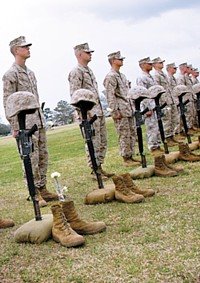10 soldiers killed Tuesday as violence increases across country
 Ten American soldiers were killed on Tuesday, the military announced today, bringing October’s death toll for United States forces to 69.
Ten American soldiers were killed on Tuesday, the military announced today, bringing October’s death toll for United States forces to 69. Four of the soldiers were killed by a roadside bomb west of Baghdad, and three others died in fighting in Diyala province, a troubled area northeast of the capital where sectarian violence has run high.
A Marine was killed by insurgents in Anbar province, the western region where the Sunni insurgency is centered, and two soldiers were killed in Baghdad, one by insurgent gunfire and one by a roadside bomb.
In addition to the American casualties, the Iraqi chief of intelligence for Maysan province in the south died along with four of his bodyguards when his car touched off a bomb planted on a highway.
Complying with a request from the Iraqi government, the American military released a senior aide to Shiite cleric Moktada al-Sadr today, a military spokesman said. The aide, Sheik Mazin al-Saedi, had been detained early Tuesday on suspicion of attacking Americans and directing the kidnappings, killings and torture of Sunnis and Shiites.
"It’s a government-of-Iraq issue," said Lt. Col. Christopher C. Garver, a military spokesman in Baghdad. The arrest had enraged Mr. Sadr’s followers in Baghdad.
The status of the militia forces loyal to Mr. Sadr has become a point of increasing conflict between American officials and the government led by Prime Minister Nuri al-Maliki, which depends on Mr. Sadr’s support.
The announcement of Mr. Saedi’s release came as Mr. Maliki met with Mr. Sadr in the southern city of Najaf. Asked about the case, the prime minister said, “We are trying to find political solutions for all crises, and that will terminate all detentions and all tension, so that things go back to normal.”
Mr. Maliki also met with Grand Ayatollah Ali al-Sistani. Afterwards, the prime minister said he made the unusual visit to the country’s most powerful Shiite cleric “so that the security and political situation can be stabilized, allowing the government to turn its attention to reconstruction,” according to The Associated Press.
In a sign of continuing sectarian conflict elswhere, Sunni and Shiite leaders in Balad met to investigate the fate of more than 40 people who are still missing after being kidnapped at a checkpoint outside the city on Sunday, the A.P. reported. More than 60 people died in attacks and reprisals over the weekend.
Read the rest at the NY Times
Related Link:
Rumsfeld: US military too strong to lose Iraq war
Related Link:
Sadr movement plans protest after arrest
Related Link:
Expert: Iraq now in 'serious civil war'
Related Link:
Iraq PM: Disarming militias on hold; U.S. over-reliant on force; Rejects U.S. Sadr city attack
Related Link:
Saddam says victory at hand against U.S. occupation

<< Home